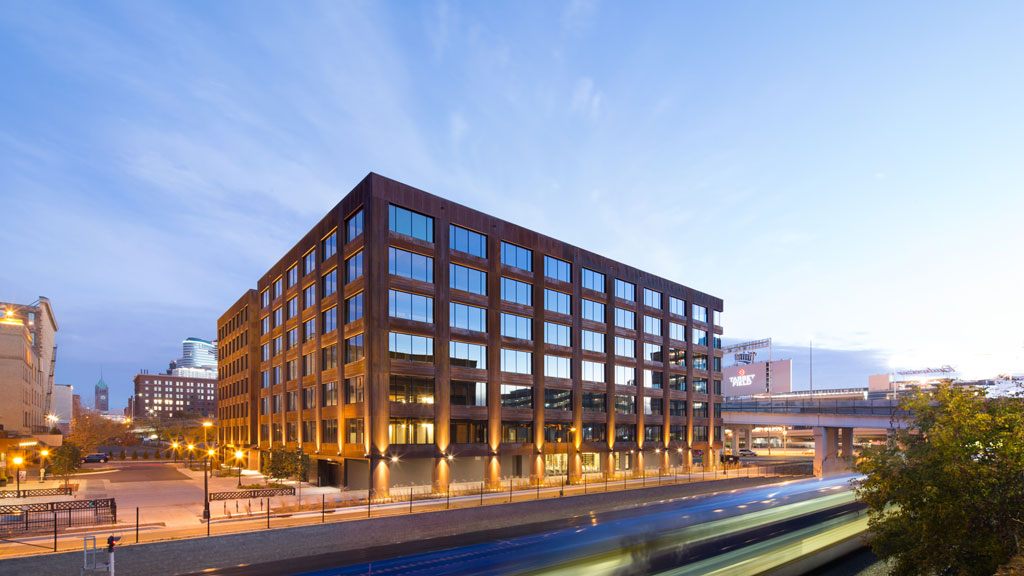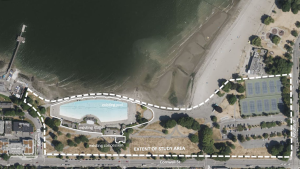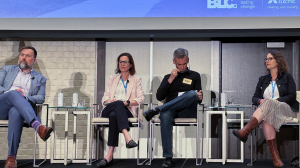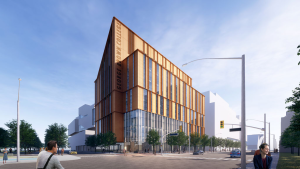Plans to build Western Canada’s tallest mass timber office building in Vancouver have been unveiled by PC Urban Properties Corp and Hines.
The two companies are partnering to develop a transit-connected, high-tech, 10-storey, mixed-use office building in Vancouver’s Mount Pleasant neighbourhood.
The 196,000-square-foot building is being designed according to Hines’ proprietary T3 system which combines timber, transit and technology. Hines developed T3 in response to evolving tenant requirements.
“For offices, we find being connected to the community and transportation very important, especially as we emerge from the pandemic,” said PC Urban CEO Brent Sawchyn.
The site of the project is a piece of city-owned land currently occupied by the Simon Fraser University Annex, a 1928 heritage building.
Sawchyn explained a major part of the project will be restoring, preserving and incorporating the historic structure into the design. He noted that PC Urban has extensive experience with similar heritage projects in the area.
“We will reorient it on the site of the project then integrate into the building,” said Sawchyn of the Annex. “The city plans are for it to become a community art venue to foster artists in Mount Pleasant.”
Sawchyn explained using modern sustainable mass timber as the main structural and floor elements, the project aligns well with Vancouver’s and the province’s environmental goals for buildings.
According to PC Urban, timber also has natural anti-bacterial and anti-microbial properties in addition to its environmental performance. The project will feature state-of-the-art HVAC systems to improve indoor air quality and its design will incorporate natural light and other energy efficient tools.
The project will be targeting tenants in creative industries such as technology, advertising, media and biotechnology/life sciences, with creative industrial and retail space on the lower floors. Common tenant amenities will include social workspaces and tenant collaboration areas; an activated rooftop deck; potential for private outdoor balconies; shared conference space and high-tech AV systems; a spa-quality fitness centre, bike storage and end-of-trip facilities; and high-quality Wi-Fi throughout.
Sawchyn explained while he believes it is still too early to gauge the lasting impacts the pandemic will have on work and workspaces, some early trends have emerged.
“Over the course of the last year we have all had to adapt to things and use technology to our advantage as lots of work moved remote,” he said. “Our business functions better in an office and our team would prefer to be in an office. It is about those things that make us human, those experiences of seeing people and the serendipity of sharing information.”
He noted while the pandemic is far from being behind us, tenants like those the T3 building in Mount Pleasant is target, will likely be rethinking office layout.
“The pandemic will live with us for a while longer and I think we will see a lot of people wanting more space,” said Sawchyn. “They don’t want to be cheek to jowl like you see in some creative spaces that do game or video production. I think we will see places like that expand their footprints.”
He noted higher ceilings, more natural light, more natural air, outdoor and deck space, touchless systems and high-tech air filtration with become more common.
“But a lot of this is in its infancy as we are learning what people will respond to,” he said.
And while he noted that the province and Vancouver are making efforts to advance tall mass timber construction, places like Germany already have a head start.
“From a building code perspective, the region is becoming more used to it and understanding it more,” he said. “And the building code is catching up to this. I think we will see a lot more of it. But the constraint we have right now at 10 storeys isn’t because of building form or timber. It is being limited by city bylaws. We could go much higher.”
He added if the mass timber industry takes off and develops its manufacturing capabilities, it could be a world leader.
Construction on T3 Mount Pleasant is expected to begin in 2022 and be complete in 2024.
Follow the author on Twitter @RussellReports.










Recent Comments